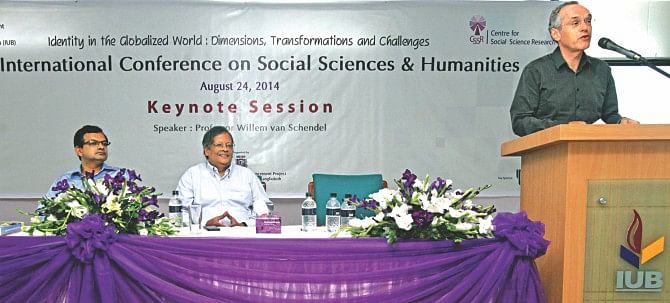Political, not scientific
Political, not scientific
Says Prof Willem van Schendel

The government's circular to avoid the word "Adivasi" is a political interference in the way a certain group of people talk about their own society, said noted scholar Prof Willem van Schendel.
"Advasi is a perfectly acceptable Bengali word. The Bengali language is not owned by anyone; it's a shared ownership. So how can somebody tell you not to use this word... from a social science point it makes no sense at all," said Schendel, a professor of Modern Asian History at University of Amsterdam.
The professor came to Dhaka to attend a three-day international conference on Social Sciences and Humanities, which began on Saturday.
Centre for Social Science Research (CSSR) of Independent University, Bangladesh (IUB) organised the conference at IUB campus in the capital's Bashundhara. The theme of the conference is "Identity in the globalised world: Dimensions, transformations and challenges."
Also a historian, Prof Schendel shared some of his views about identity crisis and state of social sciences in Bangladesh in an exclusive interview with The Daily Star on Saturday.
The Press Information Department (PID) on August 7 issued a release (reference No 2704) urging the media, experts, university teachers and civil society members to avoid the word, Adivasi, at discussions and talk-shows on International Day of the World's Indigenous People.
Prof Schendel said not all the people who live in Bangladesh are Bengalis. There are garos, chakmas and so on living in the country. They do not consider themselves Bengalis, but Bangladeshi citizens. These people call themselves Adivasi or indigenous people.
"If somebody calls themselves by certain terms, who are outsiders to say they cannot do that?” he asked.
"I think it is political thing but it is unacceptable from a social science point of view where you have to understand why certain people start calling themselves Adivasi and what it means in terms of social dynamics," he said.
Prof Schendel, also an anthropologist, said it is clear that they [indigenous communities] do so to show that they are being treated as secondary citizens and they claim full citizenship.
Asked what the government should do, he said it is really up to the citizens to tell the government what to do.
Prof Schendel said identity, which is the topic of the conference, is a huge issue in Bangladesh.
"Who are we -- are we Bengali, Bangladeshi, or Muslims? Everybody is talking about it. But you don't understand all these different identities if you don't know your own history. If you know how things started you can also understand how it works through the society now and in the near future," he said.
The anthropologist stressed on studies on social sciences and humanities, saying, "If you listen to Bangladeshis discussing life, it is always about social or political or religious problems. They don't talk about mathematics or physics."
"You really need people who can analyse what is going on much more rigorously than most people do. And that's what social scientists are for. They can tell you that you have these problems and there are certain solutions. So they can be very important," he added.
Prof Schendel thinks social science is broadening in Bangladesh in a very good way, but there is much more to do.
He presented a keynote on 'interconnected Asia' yesterday at the conference.